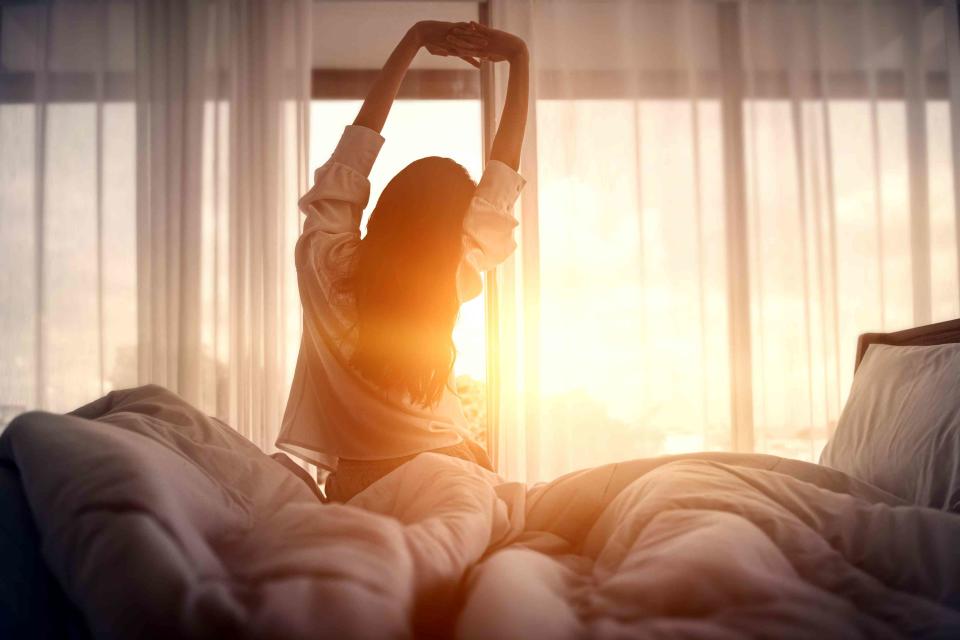The #1 Habit You Should Start to Boost Your Energy Levels, According to Doctors
It's free and requires little to no effort on your part.

Getty Images
Reviewed by Dietitian Maria Laura Haddad-Garcia
If you feel like you're always operating at 50%, you have trouble catching enough zzzs, or you just can't seem to function without a cup of coffee, it's time to reassess your morning routine.
The way you start your day has a major impact on your energy levels throughout it. And adding one specific a.m. ritual has been repeatedly shown to help boost your energy, which can translate to a peppier mood and perhaps even more items crossed off your to-do list. Below, top doctors share the number one habit you need to start if your goal is upping your energy—no caffeine required.
Related: Anthony Anderson Shares the Surprising Daily Ritual He Does Every Morning
What Is the #1 Habit to Start for More Energy?
Before thinking about brewing a pot, step outside and soak in the sun. Health experts agree that exposure to morning sunlight is an easy, no-cost method to boost your energy levels.
Whether or not you're exposed to light upon waking up is a key determinant of how much energy you'll have throughout your day. That's because light helps set your circadian rhythm or your "internal day versus night time clock," says Jacob Teitelbaum, M.D., board-certified internist, expert in chronic fatigue syndrome, and author of the best-seller From Fatigued to Fantastic!
"While many factors influence this circadian rhythm, light and melatonin are the key players," says Sid Khurana, M.D., DFAPA, DFAACAP, Board-Certified Adult, Child & Adolescent Psychiatrist.
How Viewing Light Early in the Day Can Boost Your Energy
"Keeping a healthy circadian rhythm used to be an easy feat for the body before lightbulbs, cell phones, televisions and numerous other light-emitting devices were invented,” Teitelbaum says. That's why it's so important to focus on optimizing how we view light throughout our day.
Bright light early in the day tells your circadian rhythm that it's morning and then helps set the clock correctly for the entire day.
When photons hit your eyes, this triggers your body to produce several chemicals that are responsible for boosting your energy, most notably:
Cortisol: Cortisol (also known as the stress hormone) is produced by the adrenal gland, and its levels are highest in the morning, triggering wakefulness, Teitelbaum says. In fact, bright light exposure was shown to spike cortisol levels significantly in a small 2021 study in The International Journal on the Biology of Stress.
Serotonin: Sunshine is critical for the happiness molecule known as serotonin. Not getting enough daytime light can cause your serotonin levels to dip, leading to fatigue, as well as symptoms of depression and seasonal affective disorder (SAD), Teitelbaum says.
Melatonin: Your brain makes the hormone melatonin in response to darkness, so melatonin production is suppressed when you're exposed to light, per a 2023 study in the Journal of Photochemistry and Photobiology. "Exposure to the morning sun increases early release of melatonin at night and helps with sleep," Khurana says.
Related: The #1 Habit to Break for More Energy, According to a Dietitian
Tips for Making the Most Out of Morning Sunlight
So, how quickly after making your bed should you head outside and how long should you stay out there?
At the very least, try to get 15 minutes of sunlight and fresh air in the morning shortly after waking up, Kudara recommends. But "30 to 60 minutes of bright light exposure within an hour or two of waking is optimal," Teitelbaum says.
And if you can swing getting sunlight before 10 a.m., that's ideal. "Morning sun has the potential of providing the sweet spot of enough exposure to produce vitamin D, but without increasing the risk of dangerous effects associated with UV exposure," Khudara notes.
But what if it's too cold or always overcast in your neck of the woods? Bright, artificial light can work, too. "If you can’t go [outside], there are light boxes called happy boxes for seasonal affective disorder that you can put by your computer or workstation (or wherever you spend time) in the morning," says Teitelbaum.
While bright light was shown to suppress melatonin levels the most, overhead lighting of much lower brightness fluorescent bulbs can cause significant melatonin suppression, too, a 2022 study in Neurobiology of Sleep and Circadian Rhythms found.
Related: 7 Best Fruits You Should Eat for More Energy, Recommended by a Dietitian
The Bottom Line
Getting light in your eyes within about an hour of waking up is an easy (and free!) way to boost your energy levels. Morning light exposure triggers the production of three chemicals—cortisol, serotonin and melatonin—that help you feel wakeful and ready to take on the day. Not only that but viewing morning light can help you get better sleep, which also translates to better mood and energy levels the next day. So before you start scrolling through texts or flip open your laptop, make sure to get that morning sunlight in (or, if the weather doesn't permit, turn on all the lights at home).
Related: 7-Day Mediterranean Diet Meal Plan for More Energy, Created by a Dietitian
Read the original article on Eating Well.

